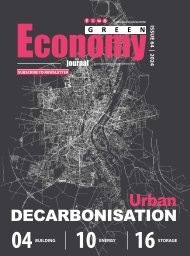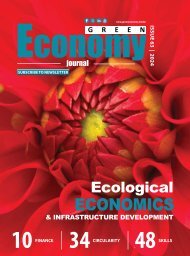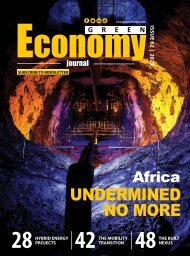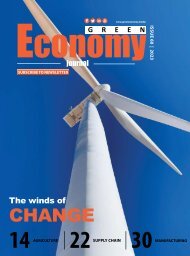Green Economy Journal Issue 57
You also want an ePaper? Increase the reach of your titles
YUMPU automatically turns print PDFs into web optimized ePapers that Google loves.
WOOD<br />
FORESTRY:<br />
a greener more<br />
sustainable future<br />
Forestry South Africa<br />
The fact that the forestry industry operates in and depends significantly on natural and human<br />
resources, means that to ensure the financial sustainability of its businesses, those businesses<br />
also must ensure their social and environmental sustainability.<br />
BY MICHAEL PETER, FORESTRY SA*<br />
Forestry is fortunate in that it is a sector which can generate<br />
its own green, renewable, recyclable and CO2-sequestering<br />
feedstock and this can be done in perpetuity, if done in a<br />
sustainable manner. As such, the South African forestry sector is<br />
truly embedded in the green economy and is the very epitome of a<br />
circular economy industry.<br />
Our sector has an excellent track record in terms of environmental<br />
conservation. An example of this is that on average only 70% of<br />
forestry estates are under timber crops while the remaining 30% of the<br />
estate is set aside primarily for the management and conservation of<br />
biodiversity and to protect the country’s scarce water resources.<br />
Independent assessments on the state of indigenous forests and<br />
grasslands show that plantation forestry estates almost invariably,<br />
have much higher levels of biodiversity than any other land uses,<br />
including in many cases, even when compared to formally protected<br />
nature reserves. This is on account of the strong management and<br />
stewardship practices which are implemented by timber growers in<br />
South Africa.<br />
Forestry products are the<br />
products of the future.<br />
While there are pervasive myths surrounding the industry’s water<br />
use, the forestry sector only uses around 5% of the total water used by<br />
the irrigated agricultural sector alone, but it returns 27% of agricultural<br />
GDP and about the same percentage of jobs. Add to this the major<br />
open areas which the industry maintains around water courses and<br />
riparian zones, and the picture of the sector’s actual water use and<br />
associated environmental practices changes dramatically.<br />
When one considers further that plantations are not irrigated and so<br />
they cost the taxpayer next to nothing compared to other water users,<br />
as they do not require dams, canals, pipelines, irrigation schemes or<br />
purification plants and it becomes difficult for an informed person to<br />
conclude that plantations are bad for the country’s water resources in<br />
terms of the relative economic, social and environmental returns which<br />
the plantation industry’s water produces for the country.<br />
If that isn’t enough to convince most well-informed people, then<br />
one should also consider that compared to most other agricultural<br />
practices, the forestry industry tills the soil and applies fertilisers and<br />
pesticides (the biggest causes of pollution of South Africa’s water<br />
resources) at a small fraction of the rate and frequency of that of<br />
most other crops, most of which employ these practices every year.<br />
So, water quality coming out of plantations is better both in terms of<br />
siltation and the presence of pollutants compared to almost every<br />
other land use in the country.<br />
In terms of social sustainability, our industry is found in rural areas<br />
where some of the worst poverty exists. To have a sector that provides<br />
employment and a myriad of other social returns through Corporate<br />
Social Investment (CSI) initiatives that fund education, food security,<br />
health care, infrastructure, enterprise creation and social upliftment,<br />
etc, is fantastic and something we are very proud of.<br />
Besides the massive CSI programmes, there are innumerable<br />
examples of small and medium-scale timber growers and processors,<br />
who have opted to continue to use manual inputs in processes, which<br />
could be performed far more efficiently through mechanisation and<br />
automation, simply because they wish to continue to support the<br />
communities in which their businesses operate.<br />
As a country with one of the highest unemployment rates in the<br />
world, we should be putting in place mechanisms to incentivise<br />
businesses to keep putting people ahead of profits, as without such<br />
support, many businesses may not be able to sustain themselves<br />
in financial terms, unless they embrace further mechanisation<br />
and automation.<br />
In a world where economic recovery is on everyone’s lips, the focus<br />
needs to be on the activities that can be truly called green. These will<br />
not only drive a more sustainable economic recovery, but also limit our<br />
effect on the planet. Sectors, like ours, that place a strong focus on the<br />
sustainable use of a renewable natural resource, whose end-products<br />
are reusable and recyclable, will provide a blueprint for a green, circular<br />
economy going forward.<br />
Globally, people are looking for solutions that will reduce, if not<br />
eradicate, our reliance on the extraction of finite resources from our<br />
planet. They want a renewable feedstock that can be replenished<br />
and repurposed into a myriad of end-products, some which are<br />
already replacing everyday non-renewables like plastics and other<br />
fossil fuel derivatives.<br />
Forestry products are the products of the future. Be it paper<br />
packaging, wood-based fabrics, bio-plastics, timber-based buildings or<br />
futuristic green fuels, these forest products capture carbon while they<br />
grow and store it while they are in use.<br />
The rapid adoption by the rest of the world of forest products as<br />
preferred alternatives to fossil-based products, is proof positive that<br />
the entire world sees the value in the circular forestry industry and<br />
foresters are proud to be such a key part of the solution to the world’s<br />
most critical challenges.<br />
*Michael Peter is an executive director at Forestry SA.<br />
41

















